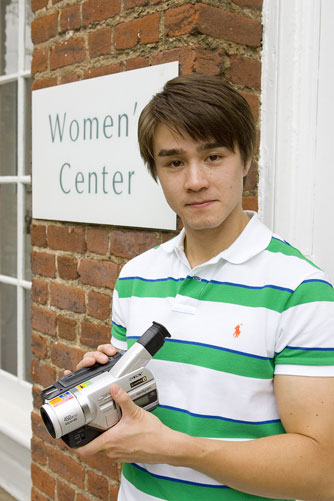May 16, 2006 —Todd Aman is one young man who is not afraid to call himself a feminist.
He became an intern at the U.Va. Women’s Center this past year out of concerns about societal attitudes toward and treatment of women. Several women close to him have been affected by sexual assault and harassment, he said.
 For Aman, who grew up in McLean, Va., and graduates on May 21, changing society’s image of the ideal woman is only half the battle. He says feminism needs to reach out to men and men need to learn about feminism, but he was astonished by the scarcity of men in the classes he took about women and gender.
For Aman, who grew up in McLean, Va., and graduates on May 21, changing society’s image of the ideal woman is only half the battle. He says feminism needs to reach out to men and men need to learn about feminism, but he was astonished by the scarcity of men in the classes he took about women and gender.
“Society doesn’t just teach women that they should be thin, submissive and unambitious, it tells men that they should be buff, aggressive and self-centered,” said Aman, who has taken courses such as “Gender Politics,” “Gender and Society” and “Community Activism and Feminist Politics: A Global Perspective.”
Aman began his college activism by joining the Asian Student Union. Among other activities, this second-generation Chinese-American was instrumental in launching the Asian Pacific American Studies minor two years ago.
The only man in the feminist politics class, he showed “a strong passion for social justice. He constantly challenged the class with his thought-provoking questions,” said the instructor, Dawn Anderson, director of diversity and mentoring at the Women’s Center.
“I am aware that various forms of oppression (gender-based, race-based, sexuality-based, height-based, culture-based) stem from the same fundamentally erroneous thinking,” Aman wrote in his internship application.
He also produced promotional videos for both the Asian Student Union and the Women’s Center.
Kathleen Pond, director of communications at the center, said, “Working with Todd was a highlight. … Throughout the year, he interviewed and photographed people, attended events and documented them, and created a video about the center that we were only dreaming of creating when he arrived here a year ago.”
A double major in political theory and religious studies, Aman has used his college years to explore intersections between those subjects and gender and minority status.
“The most important thing that I learned from the courses that I’ve taken is that all of our actions are political in some sense,” he said. “Obviously, the overt kind of political activity — organizing, educating, protesting — is important. But we also affect society with our daily decisions. We can either choose to perpetuate oppression or protest oppression in our words, actions and consumption.”
He gained valuable experience in the Asian Student Union and served as president his third year. In addition to working on getting the new minor in Asian Pacific American Studies approved, he organized “Explorasian,” a conference that attracted 800 Asian Pacific American students from East Coast colleges and universities to the Grounds.
Aman noticed that, with few exceptions, only Asians would attend the ASU’s events.
In his perfect world, diversity training would be mandatory. When attendance is voluntary, he said it attracts people who already have an interest or understanding, so it doesn’t necessarily change any minds. To avoid preconceived ideas, he would like to see diversity presented in a critical thinking context, where people would be challenged to explore their reasons for holding certain views and attitudes.
The orientation program for first-year students, “Different Voices, Common Threads,” is one example of a good required activity, said Aman, who helped staff the event as an orientation leader. Organizers ask a panel of U.Va. community members to give presentations about their different experiences being part of a minority. Afterwards the students and moderators break into discussion groups.
With his range of interests and experiences, Aman is ready to test himself in the real world. He plans to work for a year, possibly as a paralegal, and apply to law school with an eye toward public policy.
Media Contact
Article Information
May 16, 2006
/content/todd-amans-perfect-world-diversity-training-would-be-mandatory

